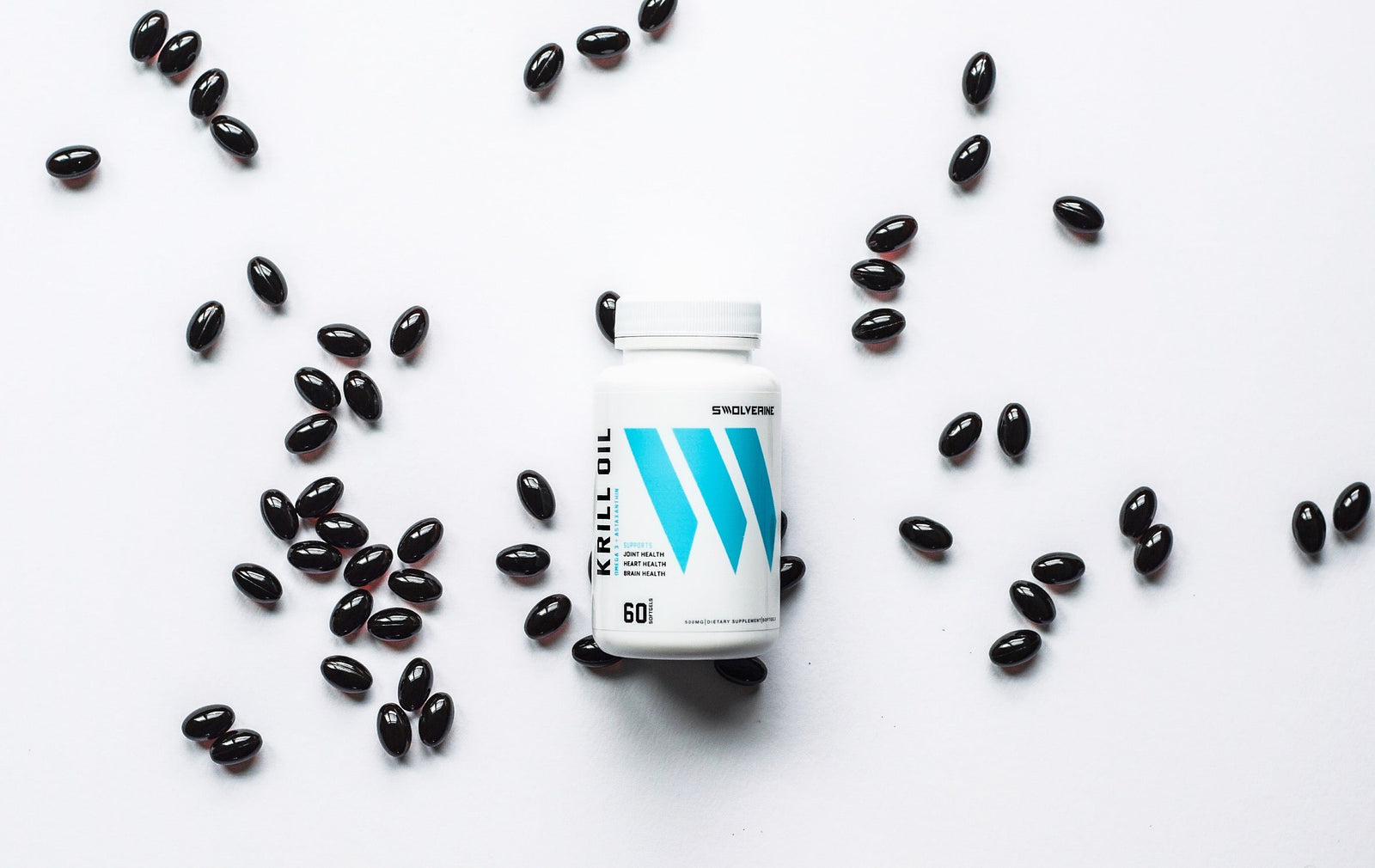It’s no surprise that most athletes and health-conscious individuals supplement with some form of Omega-3 fatty acids. Whether it’s fish oil, krill oil, flaxseed, algae, or cod liver oil, research has shown that Omega-3s offer a long list of health benefits—supporting heart health, joint function, brain performance, and even giving your skin that healthy, glowing look.
But athletes don’t just need general wellness support. You’re training hard, recovering fast, and constantly pushing your body to adapt. That’s where Omega-3s play a critical role in:
-
Increasing metabolic capacity
-
Delaying the onset of fatigue
-
Supporting muscle hypertrophy and recovery
-
Reducing systemic inflammation and oxidative stress
For years, fish oil has been the gold standard in Omega-3 supplementation. But newer research suggests that krill oil may offer superior benefits, especially for athletes and active individuals.
Let’s break down the evidence, review what the science says, and compare krill oil vs. fish oil when it comes to training, recovery, and performance.
Why Should Athletes Supplement With Omega-3?
Omega-3s are essential fatty acids (EFAs)—fats that your body cannot produce on its own and must obtain through food or supplementation.
These include:
-
EPA (eicosapentaenoic acid)
-
DHA (docosahexaenoic acid)
Both are vital for regulating inflammation, supporting cardiovascular health, and enhancing cellular function. Unfortunately, the modern diet is often far too high in Omega-6s, creating an imbalance that promotes chronic inflammation.
👉 That’s why supplementing with a bioavailable source of Omega-3s—like krill oil—is crucial for health and performance.
What Is Krill Oil?
Krill oil is extracted from Antarctic krill—tiny, shrimp-like crustaceans found in cold ocean waters. These creatures feed on nutrient-rich plankton and are naturally rich in long-chain Omega-3 polyunsaturated fatty acids (PUFAs)—including EPA and DHA.
More importantly, krill oil contains phospholipid-bound Omega-3s and astaxanthin, making it a highly bioavailable, antioxidant-rich source of Omega-3s
(Ulven et al., 2011).
What Is Oxidative Stress?
When your body produces energy, it also generates free radicals—unstable molecules that can damage your cells, mitochondria, and DNA. Normally, your body keeps this process in balance.
But intense training, poor recovery, or poor diet can cause oxidative stress—a state where free radicals outpace your body’s ability to neutralize them.
Oxidative stress contributes to:
-
Inflammation
-
Muscle damage
-
Aging and impaired recovery
-
Immune suppression
That’s why athletes need more antioxidants—and krill oil delivers one of the most powerful antioxidants in nature: astaxanthin.
Why Krill Oil Is Better Than Fish Oil
Krill Oil Has Better Bioavailability (Absorption Rate)
One of the most critical differences between krill oil and fish oil is bioavailability—how well your body can absorb and utilize the Omega-3s.
-
Krill oil: Omega-3s are bound to phospholipids—the same structure found in your cell membranes. This allows for rapid and efficient absorption.
-
Fish oil: Omega-3s are bound to triglycerides, which require breakdown by bile salts before they can be absorbed.
📈 A 2009 study published in Lipids in Health and Disease found that krill oil is absorbed 68% more efficiently than fish oil
(Maki et al., 2009).
Faster Absorption = Faster Recovery
Krill oil is absorbed within 2–3 hours, whereas fish oil may take 48–72 hours. For athletes, that faster nutrient delivery translates to:
-
Reduced DOMS (delayed-onset muscle soreness)
-
Enhanced post-workout recovery
-
Greater workout frequency and training volume tolerance
And because it’s more bioavailable, you can take a lower dose of krill oil and achieve the same (or better) plasma EPA/DHA levels as fish oil
(Schuchardt et al., 2011).
Krill Oil Contains the World’s Most Powerful Antioxidant: Astaxanthin
Krill oil contains astaxanthin, a red carotenoid pigment that gives krill (and salmon) their reddish hue. It’s one of the most powerful antioxidants ever studied, shown to:
-
Reduce systemic inflammation
-
Protect muscles from exercise-induced damage
-
Support heart and immune health
-
Enhance endurance and recovery
👉 In a study published in Frontiers in Nutrition, astaxanthin supplementation was associated with reduced muscle damage, improved strength, and better recovery in athletes
(Baralic et al., 2015).
Even though krill oil contains less astaxanthin (~0.5 mg per 3g), its phospholipid structure enhances astaxanthin absorption, bringing it closer to the effective clinical range (4–6 mg/day)
(Guerin et al., 2003).
Krill Oil Boosts Muscle Protein Synthesis and Lean Mass
A pilot study at the University of Wisconsin-Madison evaluated krill oil’s effect on mTOR signaling—a pathway crucial for muscle growth, protein synthesis, and cellular recovery.
In a double-blind, placebo-controlled study, resistance-trained athletes consumed either 3g of krill oil daily or a placebo during an 8-week training program. Results showed:
-
Increased mTOR activation
-
+2.1% gain in lean body mass
-
Improved strength, power, and recovery perception
-
No adverse safety markers observed
(Tinsley et al., 2016)
These findings suggest that krill oil may do more than reduce inflammation—it could actively support muscle growth and hypertrophy.
The Athletic Edge: Benefits of Krill Oil for Training, Recovery, and Muscle Growth
When you train hard, your body doesn’t just need protein, carbs, and electrolytes. It also needs cellular-level support to recover, reduce inflammation, and build muscle. That’s where krill oil steps in—not just as a heart-health supplement, but as a performance enhancer for athletes.
Krill oil is a secret weapon that goes far beyond traditional Omega-3s. It targets the key factors that matter most to you as an athlete: inflammation, recovery, and lean muscle growth.
Let’s break down what the science says.
1. Reduces Inflammation and Muscle Soreness
Every rep, run, or WOD creates microtears in your muscles. That’s part of the adaptation process—but excess inflammation can delay recovery and limit performance gains.
Krill oil is rich in EPA and DHA, two Omega-3 fatty acids shown to suppress pro-inflammatory cytokines like IL-6, TNF-alpha, and CRP (C-reactive protein).
📊 In a randomized controlled trial, just 300 mg of krill oil per day led to a 28.9% reduction in pain, 20.3% less stiffness, and 22.8% improvement in mobility in people with joint inflammation
(Deutsch, 2007, Journal of the American College of Nutrition).
✅ For athletes, that means less soreness, faster recovery between workouts, and improved range of motion during training.
2. Supports Muscle Protein Synthesis via mTOR Activation
When it comes to gaining lean muscle, one of the most important cellular pathways is mTOR (mammalian target of rapamycin). mTOR is a signaling hub that regulates:
-
Muscle protein synthesis
-
Cell growth and repair
-
Nutrient utilization
Krill oil has been shown to stimulate mTOR signaling, especially when combined with resistance training.
🏋️♂️ In a double-blind, placebo-controlled study by the University of Wisconsin-Madison, subjects who took 3g of krill oil daily during an 8-week resistance training program showed:
-
A 2.1% increase in lean body mass
-
Significant improvements in strength and recovery
-
No negative impacts on blood markers or liver enzymes
(Tinsley et al., 2016, Nutrition & Metabolism)
That means krill oil doesn’t just support recovery—it may actually help drive muscle-building adaptations at the molecular level.
3. Enhances Recovery and Reduces Muscle Damage
Hard training creates oxidative stress, which leads to muscle fatigue and cellular damage. The antioxidant astaxanthin found naturally in krill oil helps fight this.
Astaxanthin has been shown to:
-
Reduce exercise-induced muscle damage
-
Decrease markers of oxidative stress
-
Improve immune function and training consistency
-
Support mitochondrial health (your cell’s energy factory)
🏃 In a study on competitive cyclists, astaxanthin supplementation improved time trial performance, power output, and fatigue resistance
(Earnest et al., 2011, International Journal of Sports Medicine).
Even though krill oil contains less astaxanthin than dedicated supplements, its phospholipid structure enhances absorption, making lower doses more effective
(Guerin et al., 2003).
4. Boosts Cognitive Performance and Mental Clarity
Training isn’t just physical—it’s mental. Krill oil contains high levels of DHA, a fatty acid critical for brain function, memory, and neurotransmitter activity.
Studies show that Omega-3s improve:
-
Cognitive processing speed
-
Focus during competition
-
Mood balance and reduced mental fatigue
For athletes juggling stress, high-intensity training, and split-second decision-making, krill oil offers a clear mental edge
(Muldoon et al., 2016, Nutrients).
Key Takeaways: Why Krill Oil Is a Game-Changer for Athletes
| Benefit | How Krill Oil Helps |
|---|---|
| 🔥 Inflammation | Reduces joint pain and post-training inflammation |
| 💪 Muscle Growth | Activates mTOR to boost protein synthesis |
| ⚡ Recovery | Improves oxidative stress and muscle repair |
| 🧠 Brain Function | Enhances focus, mental clarity, and mood |
| ✅ Efficiency | Requires smaller doses and absorbs faster than fish oil |
Whether you’re lifting heavy, training for endurance, or trying to bounce back faster between workouts—krill oil offers more than just Omega-3s. It’s an athlete’s tool for performance, growth, and recovery at every level.
Final Verdict: Why Athletes Should Choose Krill Oil Over Fish Oil
If you’re serious about performance, you already know that what you put in your body is just as important as how hard you train. And when it comes to Omega-3s, krill oil isn’t just a better option—it’s a smarter strategy.
From faster recovery and reduced inflammation to enhanced mTOR signaling, lean muscle growth, and cognitive clarity, krill oil delivers exactly what your body needs to perform, adapt, and evolve at a higher level. It’s backed by science, trusted by athletes, and built for those who demand more from every rep, every mile, and every meal.
Gone are the days of choking down giant fish oil capsules and hoping for the best. With krill oil, you get better absorption, powerful antioxidant support, and performance-enhancing benefits—all in one small, efficient, and potent dose.
Ready to train harder, recover faster, and feel better doing it?
Make the switch. Upgrade to krill oil. Your body—and your performance—will thank you.







